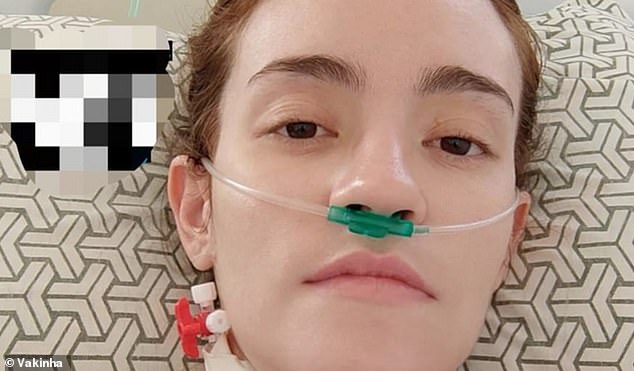Married woman, 27, suffering from chronic pain condition starts fundraiser to undergo euthanasia in Switzerland after practice is banned in Brazil
A Brazilian veterinary student suffering from a rare, incurable disease wants to die by euthanasia in Switzerland, a procedure that is banned in the South American country.
Carolina Arruda, 27, from the southeastern town of Bambuí, was diagnosed with bilateral trigeminal neuralgia 11 years ago.
Arruda was only 16 years old when she first felt pain while sitting on her grandmother’s couch.
The condition, which affects four in every 100,000 people worldwide, causes extreme pain, which she compares to a 220-volt electric shock on both sides of the face.
The disease affects the trigeminal nerve, which carries signals from the face to the brain.
Carolina Arruda, a 27-year-old veterinary student, is raising money to cover the cost of her trip to Switzerland, where she plans to die by euthanasia. The married mother of a 10-year-old girl was diagnosed with bilateral trigeminal neuralgia 11 years ago.

Carolina Arruda has bilateral trigeminal neuralgia, a condition that affects the trigeminal nerve that carries signals from the face to the brain. The condition causes pain that she compares to a 200-volt shock on both sides of her face. Chewing, brushing her teeth, drinking and even sneezing can cause pain
The pain can be caused by chewing food, brushing your teeth, drinking and simply sneezing.
“Imagine a pain that makes it impossible to speak, to laugh, to eat. It’s the simplest things that limit and paralyze this pain in a way that I can’t describe,” Arruda recently told CNN Brasil.
“There are times when all I can do is lie down and curl up in a corner and wait for the pain to go away, but it never really goes away. I live with this pain 24 hours a day.”
Arruda, who celebrated her third wedding anniversary with her husband last month and has a 10-year-old daughter, attempted suicide twice.
She has undergone four surgeries, tried alternative treatments, improved her diet and started exercising.
It wasn’t long ago that she started experimenting with cannabidiol. Although there was a slight ‘improvement’, it didn’t give her ‘complete relief’.

Carolina Arruda made the decision to opt for euthanasia because she believes she has exhausted all the options doctors have presented her with for bilateral trigeminal neuralgia, a disease that has no cure.

Carolina Arruda said her “decision to undergo euthanasia was the most difficult decision and at the same time the clearest for me.” The practice is banned in Brazil but is allowed in Belgium, Canada, Colombia, Ecuador, Luxembourg, the Netherlands, New Zealand, Spain and all six states of Australia.

Carolina Arruda with her husband
“I have tried various pharmacological treatments, from conventional medications to more experimental options,” she said. “I have invested time, money and an immense amount of energy in the search for something that would relieve my pain.”
Arruda is convinced she has exhausted all the options offered to her by her medical team and is seeking help from a charity in Switzerland, one of nine countries in the world that allows euthanasia.
She started a fundraiser on Brazilian crowdfunding site Vakinha to cover medical and travel expenses of more than $27,000.
“The decision to commit euthanasia was the most difficult decision and at the same time the clearest for me,” Arruda said. “Even with the support of my family and all the possibilities for a happy life, the constant pain turned my life into a real torment.
“Every day I tried to find meaning, to find hope, but the pain was always there, never ending,” she added. “It’s not a lack of love for life or for the people around me, it’s just a cry for compassion, for a dignified ending, you know?”
